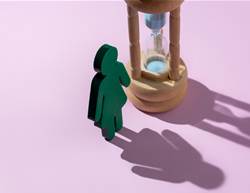When we talk about menopause, the conversation usually revolves around the big-ticket symptoms: night sweats, brain fog, anxiety, and weight gain. But one surprising, often overlooked effect of menopause is its impact on the voice.
Yes, the voice.
Whether you’re a teacher, singer, manager or someone who simply enjoys a good chat, the hormonal changes of menopause can subtly shift the way you speak, project and are perceived.
What’s really going on?
During menopause, oestrogen and progesterone levels decline. These hormones help maintain vocal cord flexibility and mucosal hydration. As they drop, so does the lubrication of your vocal cords—making your voice feel dry, strained or fatigued. Some women also experience a lower pitch or loss of vocal power, especially in the upper range.
According to a 2009 study, menopausal women showed significant alterations in vocal parameters such as reduced pitch and vocal range due to hormonal changes affecting vocal fold tissue elasticity and lubrication.
Research also highlights a condition called “menopausal dysphonia,” particularly in teachers and other voice-heavy occupations.
Who’s most affected?
This isn’t just a problem for singers or actors. Teachers, coaches, fitness instructors and anyone who uses their voice extensively may notice they tire more quickly or struggle to project. Even those not in vocally demanding roles might feel like their voice becomes hoarser or more “worn out” by the end of the day.
Women who use their voices professionally may experience more noticeable symptoms and longer recovery times from vocal fatigue during and after menopause.
The mental load of vocal strain
Feeling like your voice isn’t your own can be frustrating and, for many, emotionally unsettling. It’s more than a physical change—it can affect your sense of identity and confidence, especially if your job or social life relies on communication.
And because voice changes are rarely discussed in the context of menopause, many women don’t realise the two could be linked. Instead, they blame allergies, stress, or just assume they’re “talking too much.”
What can you do?
While you can’t completely stop the vocal effects of menopause, there are simple ways to support your voice:
-
Hydrate consistently. Dehydration worsens vocal dryness and strain. Aim for small, frequent sips of water throughout the day rather than gulping down large amounts at once.
-
Use a humidifier. Dry air can irritate the vocal cords. Using a humidifier in your bedroom or workspace helps maintain optimal moisture levels for your vocal tract.
-
Avoid excessive throat clearing. This can cause irritation and inflammation. Try swallowing, sipping water, or using a gentle cough instead.
-
Do vocal warm-ups. Just like physical exercise, your voice benefits from warm-ups. Try gentle humming or lip trills in the morning or before long conversations.
-
Watch your caffeine and alcohol intake. Both can dry out your vocal cords. Moderate your intake and balance with water.
-
Breathe through your nose. This keeps air warm and moist before it reaches your throat. Mouth breathing, especially during sleep, can dry out your vocal cords.
-
Get tested for silent reflux. Laryngopharyngeal reflux (LPR), also called silent reflux, can irritate the vocal cords without obvious symptoms like heartburn. If you frequently feel hoarse, need to clear your throat or experience vocal fatigue, speak to your GP or ENT specialist about being evaluated.
-
Limit yelling or whispering. Both can strain your voice more than regular speech. Use a microphone if you need to speak loudly for extended periods.
-
Speak to a professional. A speech pathologist or ENT with experience in vocal health can assess your voice and provide tailored exercises or treatment.
-
Consider hormone therapy. Some studies suggest HRT may help improve vocal quality in postmenopausal women, though it’s not suitable for everyone. Discuss the risks and benefits with your doctor.
-
Prioritise overall wellbeing. Stress, sleep deprivation, and poor posture can all affect vocal performance. Staying active, sleeping well, and reducing stress support both hormonal and vocal health.
Beyond menopause: A longer vocal journey
It’s worth noting that vocal changes don’t necessarily stop at menopause. With age, the vocal folds naturally lose bulk and elasticity, a process called presbyphonia. For women, the voice may become lower, weaker, or breathier—while for men, it often becomes higher and thinner.
That makes midlife the ideal time to build vocal habits that will support you well into older age. Think of it like pelvic floor training or bone health—it’s easier to maintain function with proactive care.
Here are a few additional steps worth considering:
-
See a laryngologist for persistent hoarseness. Hoarseness lasting more than 2–3 weeks should always be checked, regardless of age or menopause status.
-
Try gentle vocal strengthening. Singing in low-stress environments, humming, or guided vocal workouts can keep the vocal muscles engaged and resilient.
-
Mind your posture. Forward head posture and tension in the shoulders or jaw can compromise breath support and vocal projection.
Making space for your voice
Ultimately, this lesser-known effect of menopause is about more than physical function. The voice is personal—it’s how we express ourselves, lead conversations, hold space, and connect with others. Losing control or confidence in that area, even temporarily, can chip away at identity and self-esteem.
Opening up the conversation about menopausal voice changes helps challenge the stigma of ageing, expands our understanding of hormone-related symptoms, and empowers women to ask for support in places that matter—at home, in healthcare settings, and in the workplace.
Because your voice still matters—how it sounds, how it feels, and how it’s heard.









